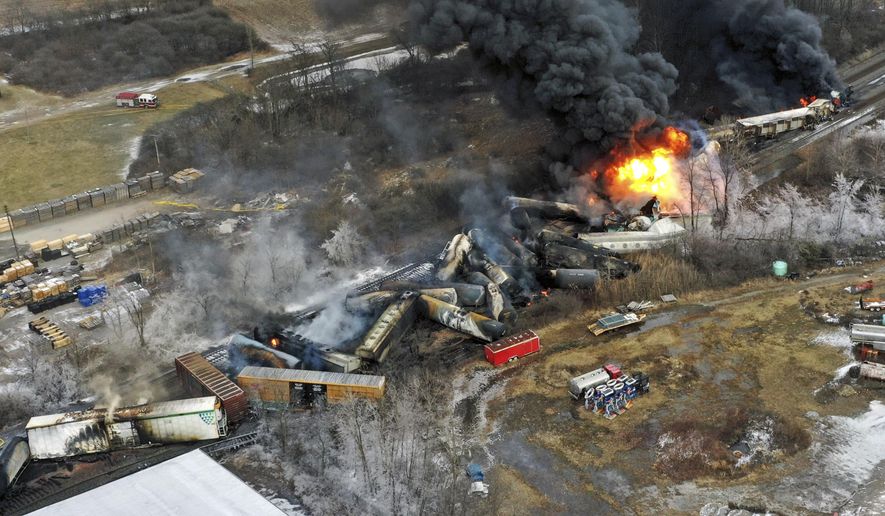A senior Environmental Protection Agency lawyer managed cleanup efforts and congressional oversight of the toxic train derailment last year in East Palestine, Ohio, although her husband’s law firm was defending the company responsible for the wreck.
Documents obtained by The Washington Times reveal that the EPA ethics office allowed Natalia Sorgente, deputy general counsel for environmental programs and oversight, to remain on the case after conflict of interest concerns emerged months into her work.
Her husband’s firm, WilmerHale, represented the Norfolk Southern railroad.
Critics say the documents raise further questions about the federal government’s handling of the environmental disaster. The EPA produced the documents in response to a public records request from the Functional Government Initiative (FGI), a government watchdog.
The East Palestine community continues to reel from the fiery crash’s chemical spill in February 2023.
During a trip in February, more than one year after the crash, President Biden pledged to help complete East Palestine’s recovery.
Norfolk Southern is weathering legal headwinds on several fronts: private class-action lawsuits, a lawsuit from Ohio authorities and an EPA-Justice Department civil lawsuit for damages and alleged violations of the Clean Water Act.
Sen. J.D. Vance, an Ohio Republican who has been critical of the EPA and Mr. Biden, told The Times that the circumstances were “really, really troubling.”
FGI questioned how the connection between Ms. Sorgente and her husband, Joel Millar, could have gone undisclosed to the EPA for several months after the derailment.
“Did nobody in his office know what Mr. Millar’s wife does for a living? And it certainly seems impossible that Ms. Sorgente could field congressional oversight issues on the EPA’s highest priority challenge without knowing who was representing the company responsible for it,” said FGI spokesman Peter McGinnis. “To top it off, the ethics gatekeepers seemed remarkably disinterested in putting an end to this apparent conflict of interest.”
Sen. Sherrod Brown, an Ohio Democrat in a tough reelection race in the increasingly conservative state, has been critical of the administration’s response to the environmental disaster in East Palestine.
He originally declined to comment but, upon seeing this report, said he would seek answers from administration officials.
“Norfolk Southern must be held accountable for the devastating derailment in East Palestine, and residents deserve assurances that the corporation has zero influence over EPA’s long-term work to help clean up this community,” Mr. Brown said. “I will be pressing the administration for answers.”
The EPA said in a statement that the agency and its employees “take seriously our obligations to abide by federal ethics laws and regulations. Ms. Sorgente appropriately consulted with the agency’s career ethics officials and received advice that she is following.”
The alleged conflict of interest does not necessarily run afoul of ethics standards.
Bruce Green, chair of Fordham Law School’s Center for Law and Ethics, said the EPA could have been notified sooner, but Ms. Sorgente’s duties do not “sound like they’re adverse to Norfolk Southern” because neither she nor her husband is involved in the litigation.
Internal EPA emails show that Ms. Sorgente first contacted Victoria Clarke, an ethics attorney for the EPA general counsel’s office, about the matter on June 20, four months after the EPA first ordered Norfolk Southern to clean up and pay for the toxic derailment. Ms. Sorgente asked whether she should recuse herself, given her work with the solid waste and emergency response law office, which provides legal support to EPA’s hazardous and solid waste programs and cleanups.
“I just learned over the weekend that my husband’s firm (WilmerHale) is representing Norfolk Southern in some way in connection with the East Palestine train derailment. My husband didn’t know,” Ms. Sorgente wrote to Ms. Clarke, followed by a brief redaction. “I’ve been working on the East Palestine matter in a couple of capacities at EPA — in my role working with SWERLO and in my role working on Congressional oversight. Do I now need to recuse? Given that it may be hard to replace me, is this something where a waiver might be considered?”
Ms. Clarke initially told Ms. Sorgente that she would need to recuse herself but the extent of her recusal depended on the roles she and her husband had in the East Palestine response. Because neither Ms. Sorgente nor her husband was involved in the litigation aspects of the case and because her husband was a salaried employee instead of a partner at the firm, Ms. Sorgente was ultimately allowed to continue her work.
“I attend meetings about the status of the cleanup and related matters (like which facilities will accept the waste) and I am working on responses to Congressional inquiries,” Ms. Sorgente told Ms. Clarke. “There also may be a Congressional field hearing this summer that I would work on if I’m able.”
Ms. Clarke said the role of Ms. Sorgente’s husband as simply an employee was not enough to warrant a change but advised her to “not participate in any specific party matter (grants, contracts, litigations, permits, etc) where the firm is a party or representing a party.”
“You (with the help of Zach and SWERLO) should be vigilant when working on specific party matters and screen for Wilmer Hale,” Ms. Clarke said.
EPA did not answer questions about whether Ms. Sorgente was still handling cleanup efforts or congressional oversight matters.
The excavation of contaminated soil at the crash site was completed on Oct. 29, and the last truck of hazardous soil was shipped the next day, the EPA said.
• Ramsey Touchberry can be reached at rtouchberry@washingtontimes.com.




Please read our comment policy before commenting.